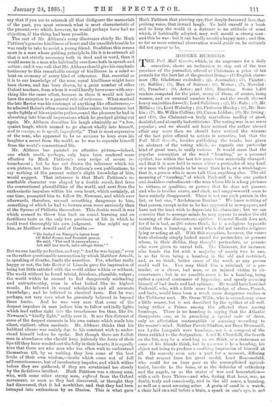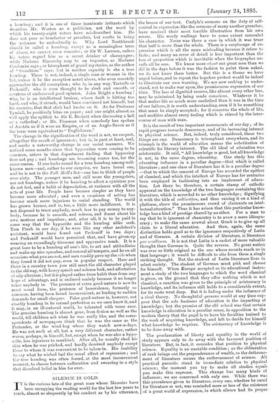MODERN HUMBUGS. MODERN HUMBUGS.
THE Pall Mall Gazette, which, in its eagerness for a daily sensation, shows an inclination to step out of the true province of the journalist, offered at Christmas a prize of ten pounds for the best list of the greatest living—(1) English statesman (Mr. Gladstone excluded) ; (2), Journalist ; (3), Painter ; (4), Soldier ; (5), Man of Science ; (6), Writer ; (7), Novelist (8), Preacher ; (9), Actor; and (10), Humbug. Some 1,450 readers competed for the prize, many of them, of course, being women, and an unusual number fools ; and the result showed heavy majorities for—(1), Lord Salisbury ; (2), Mr. Sala ; (a), Mr. Millais ; (4), Lord Wolseley ; (5), Professor Huxley; (6), Mr. Enskin; (7), Mr. Wilkie Collins ; (8), Canon Liddon ; (9), Mr. Irving ; and (10), the Claimant—a truly marvellous medley of good, doubtful, and absurdly bad criticisms. The voting was in no sense popular ; and we should not have noticed the rather absurd affair any more than we should have noticed the winners of the last prize offered to artists in acrostics, but that the Pall Mall Gazette, besides publishing the totals, has given an abstract of the voting which, as regards one particular kind of great man, is really curious. It would seem that the popular conception of the word " humbug," as a personal epithet, has within the last few years been materially changed ; and that it is now held to mean either a pretender of any kind, or a man who pretends to be more than he is, or a wind-bag,that is, a person who is more talk than anything else. The old
meaning of "humbug," of which Pecksniff is the one perfect and deathless embodiment—the man whose life is along pretence to virtues, or qualities, or powers that he does not possess, and who is besides suave, and sleek, and soapy—would seem to have entirely disappeared. There is not one such person in the
list, or but one, "Archdeacon Dunbar." We know nothing of that person, except so far as he has appeared in newspapers, and have not the least wish to depreciate his character ; but we can conceive that to average minds he may appear to realise the old meaning of the discourteous epithet. General Booth does not, for if he is bad, as 205 voters think, he is a religious hypocrite rather than a humbug, a word whioh did not involve religions lying or acting at all. 'With this exception, however, the voters have obviously simply looked round for pretenders, or persons whom, in their dislike, they thought pretenders, or persons who were given to unreal talk. The Claimant, for instance, who heads the list with a majority of nearly two to one, is as far from being a humbug in the old and restricted, and, as we think, better souse of the word, as any person could well be. You may think him a criminal, or a pretender, or a clever, bad man, or an injured victim to circumstances; but in no possible sense is he a humbug, being rather a cynical contemner of hypocrisy, and openly accusing himself of bad deeds and bad opinions. Ile would have horrified Pecksniff, who, with a little more knowledge of chess, French, and facts, would have been a much more dangerous cuckoo in the Tichborne nest. Mr. Oscar Wilde, who is second, may come a little nearer, but is not described by the epithet at all well, being rather a Prince among the affected than among humbugs. There is no humbug in saying that the Atlantic disappoints one, or in preaching . a special code of dress, only an affectation contemptible or amusing according to the wearer's mind. Neither Piercie Shafton, nor Beau Brummell, nor Lydia Languish were humbugs, nor is a compost of the three entitled to the designation. Lord It. Churchill, the fourth on the list, may be a wind-bag as we think, or a statesman as some of his friends think, but in no sense is he a humbug, his object not being to produce a soothing impression of himself at all. He scarcely even acts a part for a moment, differing in that respect from his great model, Lord Beaconsfield, who could for an hour pose as the accomplished agriculturist, bucolic to the bone, or as the defender of orthodoxy . and the angels, or as the orator of woe and lamentation— with a crib from Thiers—and who, during that hour, was, no doubt, truly and consciously, and in the old sense, a humbug, as well as a most amusing actor. A grain of sand in a watch, a chair laid on a rail before a train, a spark in one's eye, is not
a humbug ; and it is one of those inanimate irritants which describes Mr. Warton as a politician, not the word by which his twenty-eight voters have misdescribed him. He does not pose as benefactor or preacher, but exults in being the nuisance he undoubtedly is. Why Lord Northbrook should be called a humbug, except as a meaningless term of abuse, we cannot even conceive ; or Sir W. Lawson, unless his voters regard him as a secret drinker of champagne ; while Madame Blavatsky may be an impostor, as Madame Coulombe says ; or bierophant of grand mysteries, as the author of " Occultism" says; but in neither capacity is she a true humbug. There is not, indeed, a single man or woman in the list, unless it be the exception noted above, who even remotely approaches the old conception ; who is, in any way, Tartuffe or Pecksuiff ; who is even thought to be sleek and smooth, or covetous of undeserved good opinion. John Bright a humbug ! why, he is an intellectual bruiser, whose fault is hitting too hard, and who, if struck, would have convinced not himself, but his enemies, that that stick had knobs on it. As for Professor Tyndall, he positively bites on paper ; and one might almost as well apply the epithet to Sir E. Beckett when discussing a bell or a cathedral ; or Mr. Freeman when somebody has spoken of Austria as if it were an Empire, or of an Anglo-Saxon as if the term were equivalent to Englishman."
The change in the signification of the word is not, we suspect, altogether the result of ignorance; but is, in part at least, real, aud marks a noteworthy change in our social manners. We noticed some months since that hypocrites were ceasing to be common, actors in that department finding that hypocrisy does not pay ; and humbugs are becoming scarce too, for the same reason. If one looks round for a true humbug among wellknown men—and, rather to our surprise, we have found one, and he is not in the Pall Mall's list—one has to think of people over sixty. The younger men, and still more the youngsters, are not humbugs, unless it be humbug to affect a cynicism you do not feel, and a habit of depreciation, at variance with all the acts of your life. People have become simpler as they have become more educated ; and even a suspicion of acting has become much more injurious to social standing. The world has grown keener, and is, too, a little more indifferent. It is not disposed to trust anybody, much less to pay money to anybody, because he is smooth, and solemn, and fluent about his own motives and impulses ; and, after all, it is to be paid in some way that the hypocrite and the humbug alike seek. Tom Pinch in our day, if he were like any other architect's assistant, would have found out Pecksniff in two days ; and Pecksniff would have perceived that, and have given-up wearing an exceedingly tiresome and oppressive mask. It is a great bore to be a humbug all one's life, to act and attitudinise and make-up nice speeches, and conceal all tempers, and be on all occasions what you are not, and men readily gave up the role when they found it did not pay, even in popular respect. Here and there in a country town you still meet the old character played in the old way, with heavy speech and solemn look, and affectation of oily altruism ; but it is played rather from habit than from any hope of advantage, and is endured mainly because it no longer takes anybody in. The pretence of extra good-nature is now its most usual form, the pretence of benevolence, formerly so Common, having been found inconvenient, as leading to sudden demands for small cheques. False good-nature is, however, not exactly humbug in its rotund perfection as we once knew it, and it may, in an ill-natured world, be tolerated with some ease. The genuine humbug is almost gone, from fiction as well as the world, till children ask what he was really like, and the correspondents of newspapers think that be was the same as the Pretender, or the wind-bag whom they watch now-a-days. He was not such at all, but a very different character, rather worse, perhaps, in himself, but, except when he was also a hypocrite, less injurious to mankind. After all, he usually shed his skin when he was pricked, and hardly deceived anybody except those to whom it was convenient to be taken-in. His inability -to say what he wished had the usual effect of repression ; and the true humbug was often forced, at the most inconvenient moment, to choose between suffocation and swearing in a style that dissolved belief in him for ever.







































 Previous page
Previous page